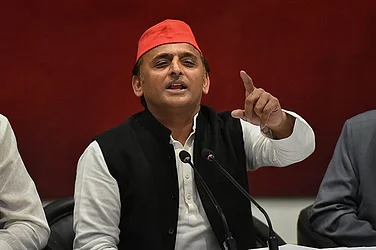The People’s Alliance for Gupkar Declaration (PAGD) in Jammu and Kashmir has rejected the draft proposal of the Delimitation Commission saying it has ignored basic criteria of the population to distribute seats. Many, however, see the proposed distribution of seats as an end to the chances of a "Kashmiri leader" ever becoming the Chief Minister of Jammu and Kashmir, a former state with a 75 per cent Muslim majority population.
“Any Kashmiri leader who harbours ambitions of becoming Chief Minister of J&K should stop dreaming. It won’t happen when the might of the Indian Government is brazenly focused on curtailing the rights of Kashmiris. Only by accepting this reality can we move forward,” Congress leader Salman Anees Soz said.
“One must acknowledge, even though grudgingly, the skill-sets of the BJP. They crafted the disempowerment of the largest minority of the country, which includes 20 crore people, as well as the 8 million majority community of its only Muslim majority state. And their brazenness is unparalleled,” PDP leader Naeem Akhtar said.
After the PAGD meeting in Jammu, National Conference president Dr Farooq Abdullah, PDP president Mehbooba Mufti, CPI(M) leader Mohammad Yousuf Tarigami jointly addressed a press conference and described the draft proposal as unconstitutional.
Addressing the press conference in Jammu, Tarigami said that the census of 2011 was the only criteria for the delimitation process. He said the government only started the delimitation exercise in J&K and it didn’t wait for the next census. He said if it wanted to increase seats there have to be some criteria based on legalities and constitution. Tarigami added that Dr Abdullah told the Delimitation Commission that the draft proposal is unacceptable to them. “The recommendations of the delimitation commission are aimed to create divisions within J&K. I think such decisions will break our hearts and we are appealing to the Prime Minister not to do it,” he said.
Tarigami further elaborated that the PAGD doesn’t want any discrimination with any region but at the same time, the delimitation commission should take decisions on the basis of legalities and constitution.
The Gujjar question
There is a divide within the leaders of the Gujjar community over the Delimitation Commission report with some senior Gujjar leaders saying that according to their population ratio they deserve 12 seats while the Commission has given only nine.
“They say the recommendations are based on equitable parameters. What is equitable parameter other than population,” says Taj Mohideen, senior Congress leader and former Minister. Mohideen acts that the Commission has acted in a biased manner and at the same time has given only nine seats to the STs while the ST population deserve at least 12 seats. “I don’t understand why they have done it,” he said.
Another leader Choudhury Zulfkar Ali said it doesn’t matter whether you give more seats to Kashmir or Jammu but what matters is what criteria you have adopted. “The basic standard is a census of 2011 and the population. Here justice shouldn’t be done but it should seem to be done. The draft proposal looks it is unjustified,” he said. He said the government could have waited for the next census and held elections according to previous seat arrangements instead of coming up with this proposal that seems based on strange criteria.
According to the 2011 census, the population of Kashmir Valley was 68,88,475 with 96.40 per cent Muslims. Jammu division had a population of 53,78,538, with 62. 55 per cent Hindus, 33.45 and per cent Muslims while Ladakh region with a total population of 2,74,289 had 46.40 per cent Muslims, 12.11 per cent Hindus and 39.67 per cent Buddhists.
A 'unique' criteria
Jammu based analyst Zafar Choudhary said, “The unique criteria adopted by the Delimitation Commission to overcome the population imbalance is previously unheard of. The Commission has accorded primacy to areas based on the difficulties people in the region faced due to military shelling and firing along the border from the Pakistani side as well as general difficulties faced by people in remote regions with hostile terrain. Both these factors favoured the Jammu region.”
In keeping with these factors, a constituency each has been proposed for Kathua, Samba and Rajouri districts on the basis of proximity to International Border and the Line of Control. Similarly, a constituency each has been proposed for Udhampur, Doda and Kishtwar on the basis of topography, remoteness and general difficulty of life," the analyst explained.
“The only new seat that has gone to Kashmir Valley is in Kupwara district, which qualifies both as being close to the LoC and where people general difficulty of living,” he added.
As the draft proposal came to the fore on Monday, they were widely condemned in the Valley. Kashmiri politicians say if the draft proposal mooted by the Delimitation Commission is made final, it will disempower the Kashmir region.
The Delimitation Commission comprises Justice Desai, Chief Election Commissioner (CEC) Sushil Chandra, State Election Commissioner KK Sharma and Chief Electoral Officer J&K Hridesh Kumar. The newly created Union Territory of J&K was the only region in the country delimitation exercise is being carried out.
"Recommendations unacceptable"
J&K Peoples Conference president Sajad Lone tweeted, “The recommendations of the Delimitation Commission are totally unacceptable. They reek of bias. What a shock for those who believe in democracy.” In an interview, he even said “Let the electoral process go to hell.” He described the Delimitation Commission draft proposal as a shame, slur on those people who are in graves because they took a bullet for India. “I am talking about the Kashmiri Muslims. And this is for the Prime Minister and Home Minister. There are at least 20-30,000 graves that have taken a bullet for India. This is how you treat him, you disempower them, disenfranchise them," he said in the interview.
The J&K Assembly was dissolved in November 2018 and the region was first under Governor’s rule and now under the President’s rule since June 2018. The government has been saying the elections in J&K will be held after the Delimitation Commission completes its exercise and gives its report. According to J&K Reorganisation Act that the number of seats in the Assembly of J&K would be increased from 107 to 114, 24 of which are reserved for Pakistan occupied Kashmir (PoK) while the election will be held for 90 seats.
Before August 5, the State of Jammu and Kashmir had 111 seats including 24 reserved for PoK and elections were held for 87 seats. With the creation of Ladakh as Union Territory, four seats of the region were reduced and the Assembly was left with 83 seats. In the previous Assembly, Kashmir had 46 seats, Jammu 37 and Ladakh four.
Last Delimitation Commission was set up in 1995 with Justice (Retd) K K Gupta as its Chairman when the State was under the President’s rule. Gupta Commission had increased J&K’s Assembly seats from 76 to the present 87. Of 76 seats, Jammu had 32, Kashmir 42 and Ladakh 2. Of 87 seats of J&K Assembly, Kashmir has 46 seats, Jammu 37 and four in the Ladakh division.


























